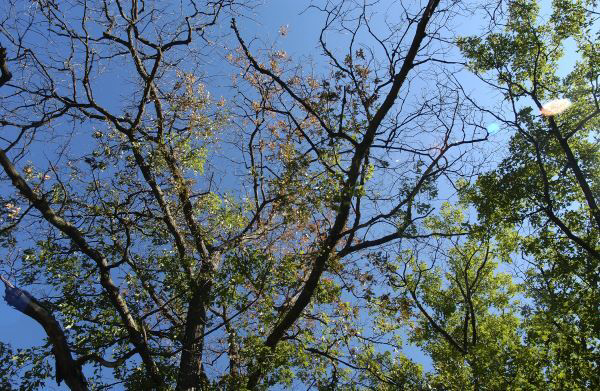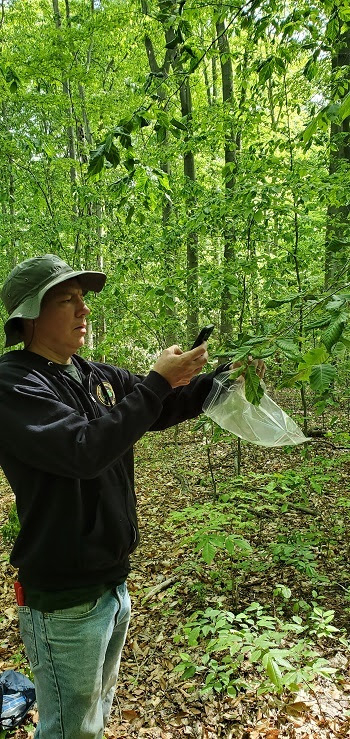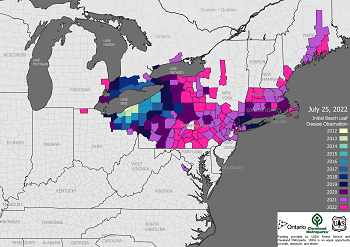To Keep Oak Trees Healthy, Delay Pruning Until Mid-July

Spring is pruning season for many tree species, but if you have an oak tree, put down your saw by mid-April.
To stop the spread of oak wilt, a fungal disease that can kill red oak trees within weeks, the Michigan Department of Natural Resources is urging homeowners not to prune any oak trees from April 15 to July 15.
Despite warm days in late winter, the risk of infection through sap-feeding beetles is still very low through April 15. Risk is highest from mid-April to mid-July, and recent research at Michigan State University indicates that in Michigan, oak infection risk peaks in May and June.
Oak wilt infection can occur when sap-feeding nitidulid beetles become contaminated with viable oak wilt spores and carry them to fresh wounds on other vulnerable oaks. Before April 15, this is unlikely to occur even if the beetles are active on warm days.
Oak wilt also can be spread by moving firewood cut from infected trees. It also spreads from tree to tree through connected, or grafted, root systems.
“After a tree is infected, there is no cure for oak wilt, so it is important to prevent infection in the first place,” said Simeon Wright, forest health resource analyst with the DNR’s Forest Resources Division.
Help slow the spread of oak wilt
Trees killed by oak wilt require special management. If you suspect a tree has succumbed to oak wilt, you can help slow the spread by burning it on-site, chipping it or debarking it before April 15. Once the wood has been dried for longer than a year and/or all the bark loosens, the firewood can no longer spread oak wilt.
If an oak tree is damaged during the high-risk period from April 15 to July 15, landowners can immediately cover all wounds with tree-wound paint or latex-based paint. Painting tree wounds is not recommended for other trees species as it can reduce the effectiveness of the healing process.
First identified in the Midwest during the 1940s, oak wilt was confirmed in Michigan and management techniques were in trial phases by 1951. It now is common in the Lower Peninsula. It also has been identified in Dickinson, Iron and Menominee counties in the Upper Peninsula.
Trees in the red oak family are most susceptible to the disease. These include black oak, northern red oak and northern pin oak – all have leaves with pointed tips. Trees in the white oak group have rounded leaf edges and include white oak, swamp white oak and bur oak. These trees are better able to block spread of the disease through the entire tree, preventing rapid death.
Watch for symptoms over summer
Symptoms of oak wilt most often appear from late June until September. Affected trees will suddenly begin to wilt from the top down, rapidly dropping leaves, which can be green, brown or a combination of both colors. Left untreated, oak wilt will continue to move from tree to tree through grafted root systems, killing more red oak over an increasingly large area when oak trees grow close together.
To minimize the risk of oak wilt infection caused by logging damage, the DNR restricts cutting of red oak trees on state-manage land between April 15 and July 15. The DNR recommends private forest landowners exercise caution during this period and, whenever possible, delay harvests in oak forests until after July 15.
What to do if you suspect oak wilt
- Report infections using the oak wilt interactive map.
- Contact a local DNR forest health specialist by email at DNR-FRD-Forest-Health@Michigan.gov for more information or to ask a question.
- Michigan State University’s Diagnostic Clinic also can verify oak wilt infection. Find instructions online or call 517-355-4536.
- Get help from an oak-wilt qualified specialist. Visit MichiganOakWiltorg for a listing and more information.
- Learn more about oak wilt and other invasive species in the state.






